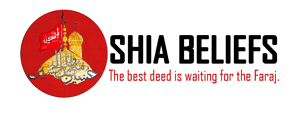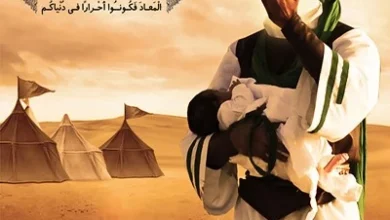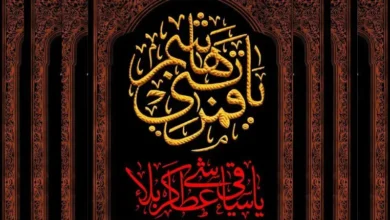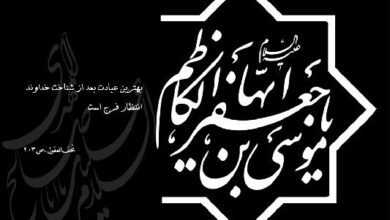The Holy Character of Imam Hassan E Mujtaba (AS)
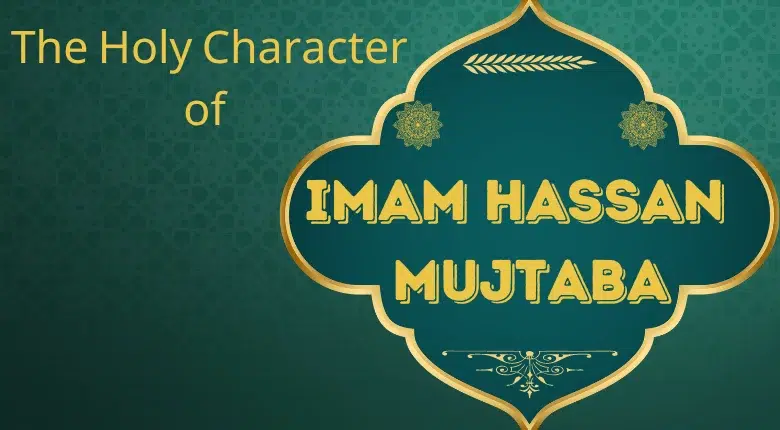
In this article, we are going to present what historians had studied in the lives of the Holy Prophet’s grandson, Imam Hassan, and his brother, Imam Hussein (peace be upon them), cannot help but conclude that they had a high level of education and spiritual and ideological upbringing, second only to their grandfather (peace be upon him and his holy progeny), mother, and father (peace be upon them).
The revelation Imam Hassan’s As characters in all ways.
His grandfather, the Messenger of Allah (s.a.w.), His father, Imam Ali (peace be upon him), and His mother Fatima (peace be upon her) provided wonderful models and everyday advice to purify and raise them per Islam.
His childhood was uninterrupted despite losing their grandfather and mother early on. His father, Imam Ali bin Abi-Talib (peace be upon him), the disciple of the Messenger of Allah (s.a.w.) and graduate of the school of Divine revelation, who was the people’s lighthouse, was alive and shading them. Imam Hassan and Hussain (peace be upon them) were definitely in Divine preparation. They were ready to deliver the Divine word. Imams Hasan and Hussein (peace be upon them) became Islam on earth.
The two Imams (peace be upon them) were identical in character, hence their behavior, march, steps, and aims were Islamic. Our debate requires dynamic examples from Imam Hassan’s (peace be upon him) spiritual, scientific, and ethical efforts.
- Spirit:
The grandson of the Holy Prophet (peace be upon him and his holy offspring) sublimated due to great preparation. His devotion to Allah was awe-inspiring.
These stories show his character:
Al-Sadiq said:
Imam Hassan bin Ali (peace be upon him) was the greatest worshipper, ascetic, and Meritor of his day.
Ali ibn Jadh’an, Abu-Na’im, and Tabaqat ibn Sa”d claim that Imam Hasan (peace be upon him) gave all his money to the poor twice, desiring Allah’s pleasure.
He even gave one sandal and kept the other. He said as he entered the mosque. O Lord! Guest at your gate. O Generous! Transgressor has arrived. Please pardon me. O Generous!”
Scientific Aspect:
The correctly enlightened Imams (peace be upon them) either learned directly from the Messenger (peace be upon him and his holy offspring) or indirectly through the prior Imam.
The Imam’s exalted inner self and infinite spirituality suited him for the self-acquired understanding of life’s new questions and advancements.
Thus, Muslim orators called the Imams’ (peace be upon him) understanding “current knowledge”. An Imam (peace be upon him) wouldn’t need to be trained or taught this. Inspiration taught him.
Several stories describe Imam Hasan’s tremendous knowledge.
- Hasan al-Basri wrote Imam Hassan (peace be upon him) regarding the Divine decision. The grandson of Muhammad (s.a.w.) replied:
“Infidels do not believe that Allah knows all abrupt events, good or ill. Allah-blaming sinners are unchaste. Allah doesn’t force obedience. Sin does not force him. His Kingdom slaves are not forgotten. His gifts are His. He controls whatever He gives them.
He instructs them and forbids them. If they obey Him, nothing can stop them; if they sin, He may stop them. If He doesn’t, He’s not responsible because He didn’t force people to do it.
He helps people by opening their eyes, instructing, warning, directing, and banning. He does not compel people to do what He instructs or avoid what He prohibits to be like the angels. Allah”s argument wins. If Allah willed, He would have guided you…”
“What’s asceticism?” He was asked.
“Piety and abstinence in this life,” he said.
“What’s forbearance?”
“Restraining rage and self-control,” he said.
What is righteousness?
“Replacing bad with good,” he said.
“What’s honor?”
“Being friendly to family and bearing sins.”
“What’s the relief?”
“Defending the neighbor, patience in conflict, and advance amid difficulties,” he remarked.
“What’s glory?”
“Forgiving when in debt.”
- Morality:
Covering this element of the grandson of the Prophet (s.a.w.) does not indicate a distinction between the guiding Imams (peace be upon him) in this or any other component of the ideal Islamic character.
They match. We’ll focus on Imam Hassan’s (peace be upon him) interactions with individuals.
His modesty:
- Imam Hassan encountered some impoverished folks who placed a few crumbs of bread they had found on the road in front of them. Eating them. They invited him to dine. “Certainly Allah does not appreciate the haughty,” he answered, accepting the offer.
Imam Hassan welcomed them home after supper. He fed and clothed them.
- Imam Hassan was seated. A beggar entered as the Imam (peace be upon him) left. The Imam (peace be upon him) met him and talked warmly. “You came while I was leaving,” he told the man. “Can I go?” “Yes, O son of the Messenger of Allah,” he said.
His Kindness to Wrongdoers:
Mu’awiyah bin Abi-Sufyan, a Syrian who hated the Messenger of Allah (s.a.w.), saw the Imam (peace be upon him) on horseback. He cursed immediately! Imam Hassan (peace be upon him) did not object. After the guy finished, Imam Hassan (peace be upon him) smiled. To him:
Old guy! You seem unfamiliar. Maybe I looked like someone else? We’ll please you if you propitiate. We’ll help if you ask. We’ll advise if you ask. We will drive you if you ask. We feed you. We’ll clothe the naked. We will enrich the needy. We will house refugees. We grant requests. We have a large house, strong social standing, and lots of money, so if you connect your luggage to ours and stay with us till you go, it will be more beneficial to you.”
Syrians cried at these words.
“I testify that you are Allah’s viceroy on earth,” he continued. Allah chooses the finest messenger. I hated you and your father. But now you and your father are my most favored creations of Allah.”
The Imam (peace be upon him) hosted the Syrian till his departure. He altered his mind on Ahlul-Bait (peace be upon them).
His generosity:
Imam Hassan (AS), who was the grandson of the Holy Prophet (pbuh), bought a garden in Madinah for 400,000 Dirhams from the Ansars, who were his followers. Then he found out that the Ansars had lost all of their money. He gave them back the farm for free.
Generosity was maybe Imam Hassan’s (peace be upon him) greatest virtue. He thought money was exclusively for feeding the hungry, clothing the naked, helping the impoverished, and paying the creditors. “We never see you disappoint a beggar,” he was asked. Why?”
“I pray Allah for His favors and desire to be near Him,” he said. Repulsing a beggar shames me since I need Allah. Allah got me acclimated to His gifts, and I got Him used to me showering them on others. I worry that if I quit, He would too.”
Anger
The story was told by Mubarak and Ibn Aisha that a guy from Syria insulted Imam Hassan (AS) when he saw him riding a horse while he was in Medina. The individual asked Imam Hassan (AS), but he did not provide a response. Imam Hassan (AS) approached the Syrian who had halted, and after joyfully welcoming him, he said: “When the Syrian stopped, I approached him.”
“Sir, I have the impression that you are not a local. It’s possible that you have another individual mixed up with me. If you seek forgiveness from others, they will offer it to you. If you require a means of transportation, we will make every effort to accommodate your needs. If you are hungry, we will give you something to eat. Should you be in need of clothing, we will provide that for you. If you are denied something, we will compensate you.
If somebody is looking for you, you may find safety here with us. Whatever it is that you require, we will see to it that it is met. And if you would want to continue on with your caravan, you are more than welcome to stay with us until you depart; this would be more convenient for you, given that we are in a favorable situation, have a high degree of dignity, and possess a large amount of property.
When the man heard what Imam Hassan had to say, he started crying and he said:
“I am here to bear witness that you are the heir of Allah on His planet. Allah most certainly is aware of the recipients of His Message. You and your Father were the creatures of Allah that I disliked the most, but today you are the creation of Allah that I adore the most.
The guy then took control of his caravan and stayed in their town as a guest until he finally left, all the while maintaining his faith in their love.
Order of Virtue:
An elderly guy sat down to perform his wudhu ritual. However, his wudhu was not performed properly. The two grandchildren of the Prophet (pbuh), Imam Hassan (AS) and Imam Hussain (AS), who were only little boys at the time, observed him. They instantly realized that the elderly guy was not performing his wudhu in the right manner, but they refrained from telling him explicitly that this was the case. It is possible that the elderly guy would experience feelings of humiliation at the hands of the two young lads, or perhaps that he will lose interest in the act of worshipping.
While they were doing the wudhu, Imam Hassan (AS) stated to Hussain, “Oh Hussain, my wudhu is accurate and more flawless than yours.” Hussain and Imam Hassan were sitting next to each other at the time.
In response to this, Imam Hussain (AS) argued that the wudhu that he had performed was superior to that of Imam Hasan.
They concluded by saying, “Let us refer to this person. Because he is older than we are, he should be the one to make the decision.”
The elderly man was attentively paying attention. Under his watchful eye, the young men, one after the other, purified themselves by performing the wudhu ritual. And after they were done, he saw that the lads had performed wudhu in a manner that was meticulous and accurate. The mistake was in his own wudhu, which he performed. He then kindly addressed Imam Hasan (A.S.) and Imam Hussain (AS), saying, “The wudhu done by you is right. I am appreciative that you have made the decision to direct me in such a wonderful way.
The Imam Hasan (AS) Household Maidservant Stated:
Not only may the Holy Qur’an be read, but it can also be learned from and put into practice. It is the word of Allah and teaches us all that we require knowledge of if only we comprehended what it said.
During one incident, a maid working for our second Imam, Imam Hasan (AS), accidentally spilled a bowl of boiling soup on Imam (AS).
She had a great deal of anxiety because she was concerned that Imam Hasan (AS) would become irate and chastise her.
She began reciting the Ayah right away, which begins, “…Those who control (their) wrath...”
Imam Hasan (AS) flashed a grin and assured everyone that he was not furious.
The following portion of the Ayah that she uttered was as follows: “...And are forgiving towards individuals…”
Imam Hasan (AS) is reported to have stated that he had forgiven her.
After that, she completed the Ayah by saying, “…Allah likes those who do right…”
Imam Hasan (AS) informed her that she was no longer bound.
The above Ayah is taken from the Holy Qur’an, and it can be found in Surah Aal-e-Imraan (3), verse 134.
Love for The Poor
Traditions said that he once ran into some poor people who had put a few pieces of bread on the ground and were eating them. They asked him to join them for dinner. He accepted the offer and said, “It’s clear that Allah doesn’t like arrogant people.
After he was done eating them, he asked them to come to his house. He gave them a lot of money, food, and clothes.
Someone once asked him, “Why don’t you turn down a beggar?”
Imam Hasan (AS) answered,
“I ask Allah to help me, and I love to be close to Him. I feel bad that I turned away a beggar because I need Allah myself. Allah made it a habit for me to get His blessings, and I make it a habit for Him to get His blessings from me. I’m afraid that if I give up my habit, he might give up his.”
Knowledge from God
Imam Hassan (AS) knew a lot and knew it well about Islamic studies. This shows that Imam Hassan (AS) was very close to the source of the word and its first ideas.
“What is asceticism?” someone once asked the Imam.
He said, “The desire to be holy and sober in this life.”
He was asked, “What is forbearance?”
“Keeping your temper in check and being in charge of yourself,” he said.
“What is right?” they asked him.
The answer was, “Replacing the bad with the good.”
They asked, “What is honor?”
“Being kind to one’s family and taking on other people’s sins.”
“What is the help?” they asked him.
“Defending the friend, being patient in war, and moving forward when things don’t go well,” he said.
He was asked, “What is glory?”
“Holding on to faith, keeping one’s self-respect, being forgiving and kind, giving back people’s trust, and making friends with the people.
